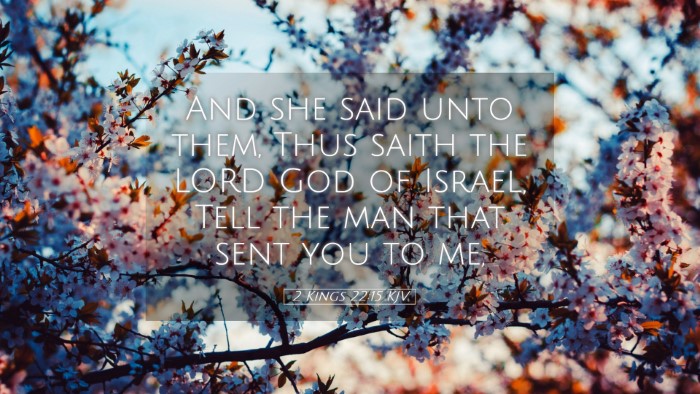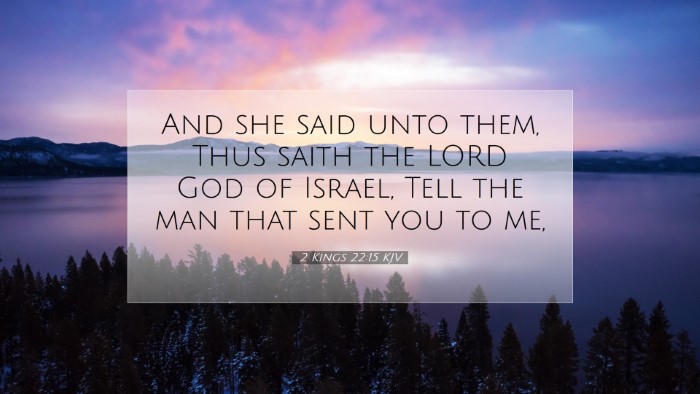Old Testament
Genesis Exodus Leviticus Numbers Deuteronomy Joshua Judges Ruth 1 Samuel 2 Samuel 1 Kings 2 Kings 1 Chronicles 2 Chronicles Ezra Nehemiah Esther Job Psalms Proverbs Ecclesiastes Song of Solomon Isaiah Jeremiah Lamentations Ezekiel Daniel Hosea Joel Amos Obadiah Jonah Micah Nahum Habakkuk Zephaniah Haggai Zechariah Malachi2 Kings 22:15
2 Kings 22:15 KJV
And she said unto them, Thus saith the LORD God of Israel, Tell the man that sent you to me,
2 Kings 22:15 Bible Commentary
Commentary on 2 Kings 22:15
Bible Verse: "And she said unto them, Thus saith the Lord God of Israel, Tell the man that sent you to me," (2 Kings 22:15, KJV).
Contextual Background
This verse occurs within a critical period in the history of Israel, during the reign of King Josiah, who ascended to the throne at the tender age of eight. The kingdom of Judah was experiencing a revival of sorts, marked by a renewed interest in the worship of Yahweh and a departure from idol worship. The backdrop of this verse is the discovery of the Book of the Law in the temple, which profoundly impacts both the king and the nation.
Summary of Insights
The following sections examine reflections and insights from notable public domain commentaries, focusing on the significance of Hilkiah's discovery, the role of the prophetess Huldah, and the implications of the message sent to Josiah.
1. The Discovery of the Law
Matthew Henry points out that the finding of the Book of the Law was not merely a historical occurrence but acted as a catalyst for national repentance. Henry emphasizes that the Law's rediscovery prompted a profound awakening in the nation, showcasing God’s sovereign timing in bringing His Word back to light. This event is perceived as a revival during a time of great spiritual neglect.
2. Huldah's Prophetic Role
According to Albert Barnes, the choice to consult Huldah, rather than a male prophet, indicates the recognition of women's spiritual authority in Israel. Huldah was a well-respected prophetess known for her integrity and insight. Barnes elaborates that her position reflects the inclusivity of God’s calling, as He often chooses unexpected vessels to convey His message.
3. The Message from God
Adam Clarke provides a detailed examination of Huldah's message. She delivers a prophetic word that affirms impending judgment on Judah because of its idolatry, but also offers hope due to Josiah’s humble heart. Clarke notes that the dichotomy in her message underscores both God's justice and mercy. Josiah's sincere response to the Law brings about a delay in judgment, illustrating the principle that genuine repentance can alter the course of divine wrath.
4. Implications for Leadership
This scripture serves as a crucial reminder for leaders in both church and society. Matthew Henry suggests that participatory leadership, where leaders consult wise and spiritually discerning individuals, can lead to more profound insights. The consultation with Huldah highlights the importance of humility and dependence on God in governance.
5. Theological Reflections
Theologically, this passage raises significant questions about the nature of divine revelation. Albert Barnes states that God speaks through whom He wills and at the time He chooses. This underscores God’s sovereignty and how He may use current circumstances to fulfill His purposes. Moreover, Adam Clarke reflects on the importance of recognizing the prophetic voice in contemporary contexts; believers should seek out and heed God’s guidance through His appointed messengers.
6. Application for Today’s Believers
Contemporary application of this passage urges modern believers to remain sensitive to God’s Word and open to His correction. Matthew Henry urges the church to prioritize the reading and teaching of Scripture, echoing the need for spiritual renewal within the body of Christ. Furthermore, Albert Barnes and Adam Clarke emphasize the importance of not dismissing the voices of those whom God has appointed to speak truths, even if they come in forms we might not expect.
Conclusion
The narrative surrounding 2 Kings 22:15 serves as a multifaceted lesson in leadership, humility, and the responsiveness of God’s people to His Word. Both pastors and scholars can glean valuable insights from this passage related to prophetic authority, the place of Scripture in national and spiritual revival, and the importance of heeding divine messages. As believers engage with this historical account, it is imperative to recognize God’s ongoing desire to speak to His people, guiding and correcting through His written Word and those called to proclaim it.
References
- Matthew Henry
- Albert Barnes
- Adam Clarke


